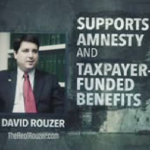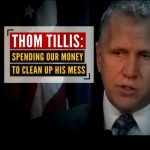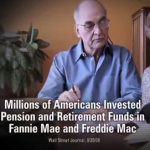Crossroads GPS claims that Colorado Sen. Mark Udall “voted to enact a carbon tax.” Udall did no such thing. Republican Thom Tillis claims that Sen. Kay Hagan “supported a carbon tax” that would destroy “up to 67,000 jobs in North Carolina over the next ten years.” That’s not accurate, either.
Locations: North Carolina
Twisting Tillis’ Tax Record
Dueling ‘Amnesty’ Claims in N.C.
Tillis Response Ad Cries ‘False’
Obamacare for the Mortgage Industry?
‘Lost Jobs’ from Obamacare
Dueling Distortions in North Carolina
It didn’t take long for the governor’s race in North Carolina to turn ugly. Although it’s only June, Republican Pat McCrory and Democrat Walter Dalton both find themselves under attack from outside groups spending heavily on misleading TV ads:
A Democratic group claims McCrory, a former mayor of Charlotte, “used his position as mayor to lobby state government for millions in tax breaks” for a company that paid him “over $140,000 to sit on its board.”
Spotlight On: Mark DiBiasio
Mark DiBiasio is a registered Republican in North Carolina’s 9th Congressional District, which means his mailbox is brimming with campaign mailers.
Ten Republicans are trying to win the May 8 primary this year. But one particular candidate, wealthy businessman and former state Sen. Robert Pittenger, is bombarding voters with glossy paper.
“I get half a dozen fliers from him in the same week – sometimes twice a day,” said DiBiasio, 55, an IT consultant who runs a local blog in the Charlotte suburbs.
Primary Piffle in North Carolina
In the final week of a hotly fought Republican primary in North Carolina, one congressional candidate accuses his rival — in a mailer sent to GOP voters — of being a “Big Money Donor” to Democrats. And he accuses another of breaking a tax pledge. But we find both claims by wealthy businessman and former state Sen. Robert Pittenger are off the mark.
In truth, financial adviser Dan Barry, the supposed “Big Money Donor,” contributed to 11 Republicans and only two Democrats in national races between 2003 and 2011.
Spotlight On: John Totten
John Totten said he often looks out for his friends and family by emailing them FactCheck.org articles.
When he came across a conservative group’s TV ad about North Carolina’s budget battle, Totten thought of a cousin who lives in that state and uploaded the video to Spin Detectors.
We found that Americans for Prosperity omitted some important information in its ad attacking the Democratic governor and praising the Republican-controlled state legislature. For example, the ad says the legislature added state funding for “2,000 more teachers” and that its budget “adds teachers.” But the legislature’s increased funding didn’t make up for the loss of federal money and discretionary state funds that local districts use to hire teachers.









